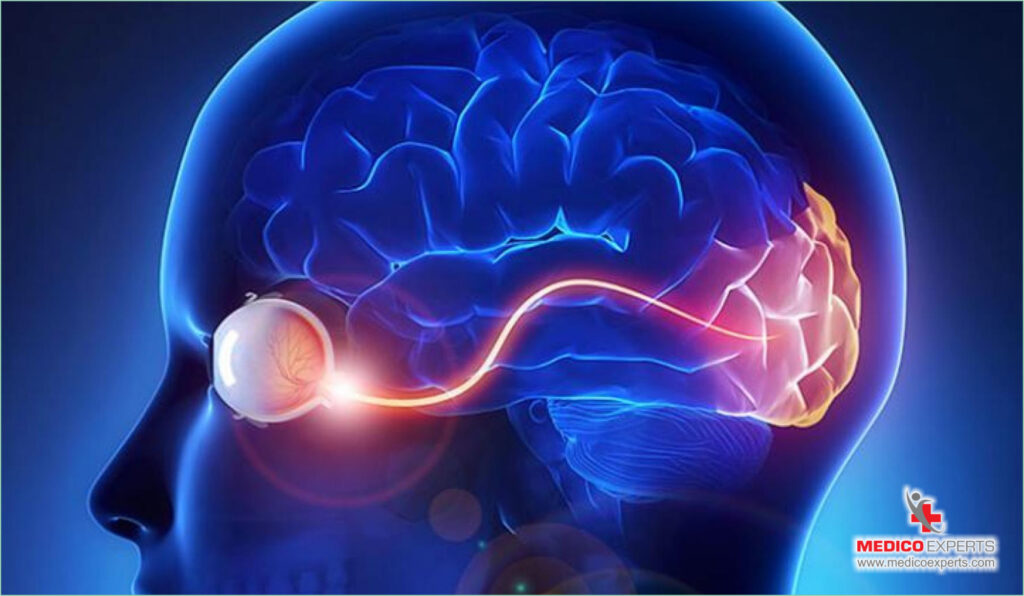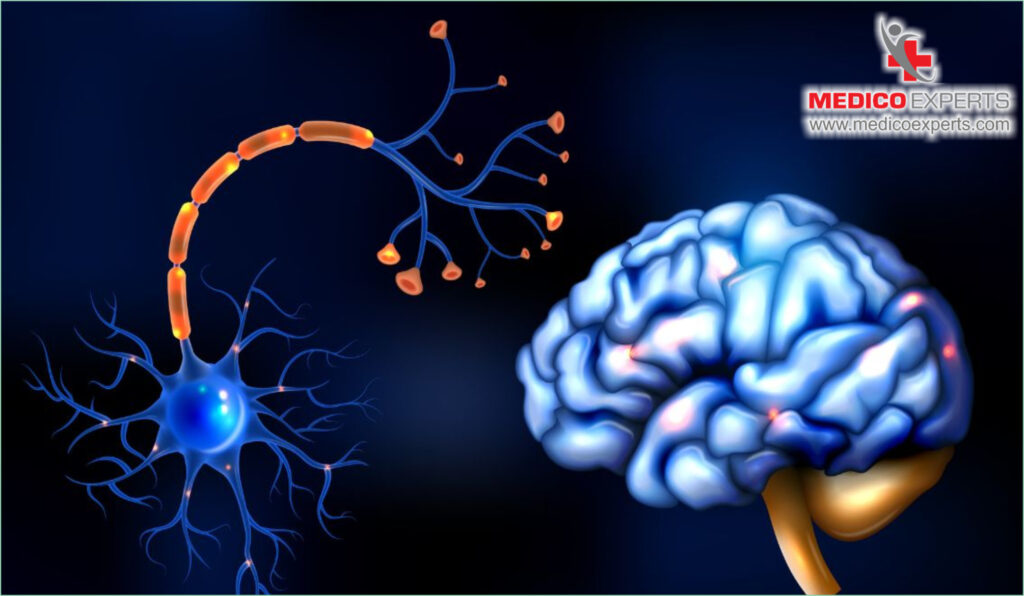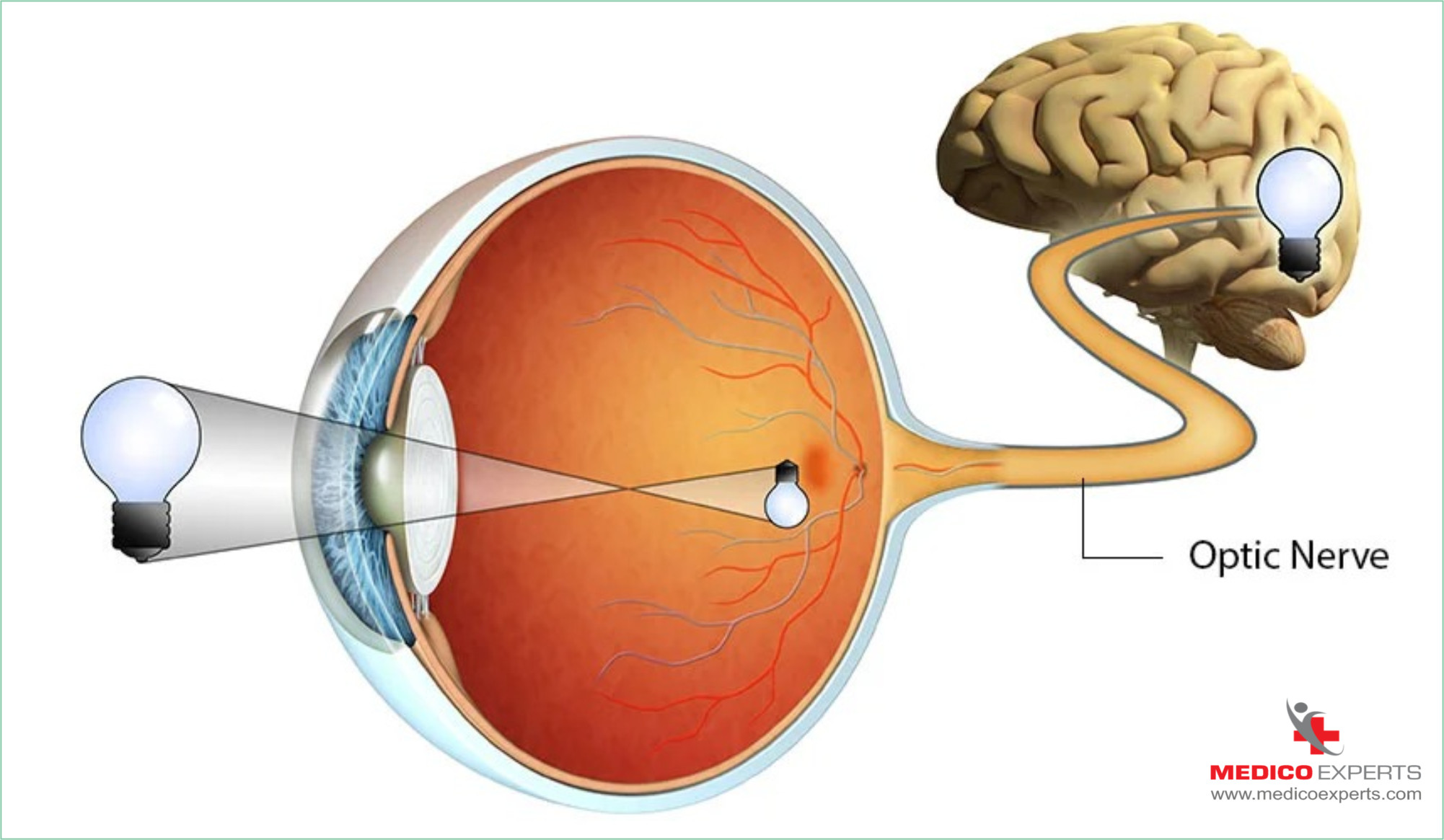Are you experiencing issues with your vision and want to know if they might be signs of something more serious?
You may have blurred vision, difficulty distinguishing colors, or a shadow creeping into your field of view, but brush it off as a temporary issue.
These could be early symptoms of optic nerve damage which is a condition that can lead to significant vision loss if left untreated.
That’s why it is important for you to recognize the symptoms early, not just to protect your eyesight but to prevent long-term complications that can impact your daily life.
We have created this blog to help detect the symptoms early and maintain your eye health to live a carefree and independent life.
What are some Common Symptoms of Optic Nerve Damage?

The optic nerve functions as a wire that connects your eyes and brain, allowing you to see clearly. When this nerve becomes inflamed, it results in a condition called optic neuritis. This inflammation disrupts the connection between your eyes and brain and can damage your vision. It affects the myelin sheath (a fatty tissue-based protective coating around the neuron) that limits the nerve’s capacity to convey visual information to the brain.
Optic neuritis typically affects adults between the ages of 20 and 50 and occurs three times more often in women than in men. While adults usually experience it in one eye, children can have both eyes affected simultaneously.
Let’s examine some symptoms to understand how they affect vision and overall eye health.
Blurred Vision
Blurred vision occurs when your eyesight is not clear or crisp. This vision change can appear gradually or unexpectedly. It is frequently one of the earliest indications of optic nerve injury.
Optic neuritis is inflammation of the optic nerve that causes blurred vision, usually in one eye.
It may increase as your body temperature rises, such as after a hot shower or exercise. Some genetic illnesses can cause optic nerve injury but those are less common than refractive errors (vision problems caused by your eye’s shape) or cataracts.
Some possible outcomes would be:
- A partial or complete loss of vision in one eye.
- A vision change that appears cloudy or indistinct significantly during certain activities.
- In this condition, colors lose clarity, appearing drab or faded out.
Eye Pain
Eye pain and nerve problems are among the most prevalent symptoms of optic neuritis, which affects more than 90% of patients. It commonly worsens when you move your eyes but mostly disappears in a few days.
Some possible outcomes would be:
- The discomfort may seem like a dull ache or a tugging feeling behind the eye.
- Eye movement creates discomfort because it strains the irritated optic nerve.
- Most people naturally heal from eye discomfort and nerve disorders, but if the chronic pain is extreme, you should consult a doctor.
Loss Of Peripheral Vision
Peripheral or side vision is essential for seeing objects outside your direct line of sight. When the optic nerve is damaged, this can lead to tunnel vision (loss of side view).
Some possible outcomes would be:
- Loss of peripheral vision frequently begins softly, with difficulties detecting things on the sides.
- This constriction might worsen with time, damaging your ability to move or see clearly at night.
- High intraocular pressure (IOP—a condition in which the pressure inside the eye exceeds normal levels) is a common cause of peripheral vision loss, which can progress to blindness if not addressed on time.
Sensitivity To Light
Photophobia, or sensitivity to bright light, may indicate optic nerve injury. Many people with optic neuritis have this sensation.
Some possible outcomes would be:
- If you have extraordinary light sensitivity, you should seek medical attention immediately since it indicates underlying nerve problems.
- You may observe flashing or flickering lights, particularly if you shift your eyes.
- Bright situations may be overpowering, producing pain or squinting.
Problems With Color Perception
Color vision typically changes due to optic nerve loss, making it challenging to determine or recognize colors.
Some possible outcomes would be:
- If colors appear less brilliant than regular, it indicates optic neuritis and requires a check-up.
- Colors may look faded or dull, reducing your ability to identify certain tones.
- This symptom may appear gradually, making it less evident until it becomes prominent.
Recognizing optic nerve injury early on can drastically improve treatment and therapy outcomes. Do not disregard the symptoms if you have hazy vision, eye discomfort, or exceptional light sensitivity.
What are the Early Signs of Optic Nerve Damage?

Some may recover from optic neuritis without requiring treatment. However, others need medical intervention to enhance their vision or, at the very least, prevent their symptoms from worsening.
Below are some red flags of nerve issues that you should look out for:
1. Frequent Headaches
Frequent headaches around your eyes or forehead may indicate a problem with your optic nerve. Headaches are one of the warning signs of nerve disorders, so don’t dismiss them.
2. Visual Disturbances or Flashes of Light
Flashes of light or flickering sights may suggest a problem with the optic nerve. These can be early indicators of optic nerve damage.
3. Difficulty Seeing at Night
A vision loss may cause you trouble seeing in dim light. Due to nerve damage, your eyes may have difficulty absorbing visual information under low illumination. If this occurs frequently, it may indicate a serious condition.
If you see any of these signs, do not ignore them. Remember that an optic nerve injury can impair your eyesight, but the sooner you detect it, the greater your odds of keeping your vision intact.
How is Optic Neuritis Similar to Other Conditions?
Other health conditions might create visual difficulties that appear to be optic neuritis. Understanding the differences is necessary for your doctor to diagnose and treat them appropriately.
Let’s look at other uncommon symptoms:
Genetic Conditions
Certain genetic disorders, such as Leber’s Hereditary Optic Neuropathy, can result in visual loss. These often run in families and may be validated by genetic testing.
Stroke In The Eye Blood Vessels
If a stroke affects the tiny blood vessels in your eye, you may have abrupt vision loss. This is more frequent in elderly adults with illnesses such as diabetes or high blood pressure, and unlike optic neuritis, it rarely causes pain.
Inflammation In Or Near The Eyes
Other forms of inflammation also impact your vision. Swelling in tissues around the eye, for example, may appear identical, but these instances frequently have different characteristics that help clinicians distinguish them.
Infections
Certain infections, such as syphilis or Lyme disease, can damage the optic nerve and cause visual problems. These are frequently associated with additional symptoms or health conditions, making it easier to distinguish between them.
Tumors Pressing On The Optic Nerve
Tumors near the optic nerve might gradually cause eyesight issues. Unlike optic neuritis, this vision loss typically occurs without discomfort and worsens with time.
Problems With The Retina
Retinal abnormalities such as hemorrhage or detachment can cause visual impairment. Eye examinations can immediately detect these issues, making them easier to diagnose.
How do doctors examine unusual symptoms of Optic Neuritis?

Doctors check for symptoms that do not fit normal optic neuritis, such as:
- Vision loss that has been progressively worse for more than two weeks.
- Vision that does not improve after a month.
- There is no discomfort when your vision changes.
- Unusual eye exam results, such as extreme edema or hemorrhage.
If your symptoms do not appear to be optic neuritis or if your recovery is taking longer than expected, you should visit your doctor so that they may examine other possible causes and help you obtain the care you need.
How do you determine if you have nerve issues?

Recognizing nerve issues sooner than later can help you manage your health better, so pay attention to specific indicators. You can look out for sure signs on your own. However, it’s essential to see a doctor if you are unsure. Always seek medical attention if your symptoms worsen or persist.
If you ask, “How do you know if you have nerve problems?” the answer is to look for these early warning symptoms and act quickly. Visual abnormalities, chronic eye discomfort, and difficulty seeing at night are signs you should be well aware of. Further delay in treatment can worsen illnesses such as optic neuritis or other nerve disorders.
Your doctor may recommend frequent eye exams to check the health of your optic nerves. They may also prescribe additional testing, such as imaging or blood work, to determine the source of your symptoms. Maintaining general health, including treating illnesses like diabetes or high blood pressure, can also benefit your optic health.
When should you consult a specialist?

Self-assessment can help you identify possible concerns but is not a substitute for expert medical advice. Knowing when to consult a professional is essential for adequately addressing the optic neuritis signs.
Doctors have access to techniques and procedures that you don’t, such as imaging (MRI, CT scans) and blood testing, which can assist in determining the specific source of your symptoms. What appears to be a small nerve problem might be the result of an underlying illness such as multiple sclerosis or glaucoma, both of which require specific treatment.
Here are some serious situations where contacting a professional is required:
1. Persistent symptoms
If visual abnormalities like blurred vision, flashes of light, or double vision persist for over a few days they may indicate an underlying issue. Persistent eye pain or discomfort also suggests nerve disorders that require specialist assessment.
2. Sudden changes
Sudden vision loss, tunnel vision, or significant changes in color perception are all serious indicators that require immediate attention. A professional can do extensive tests to determine the underlying reason and provide tailored therapies.
3. Family History or Risk Factors
If your family history includes nerve abnormalities or eye illnesses such as glaucoma, regular check-ups with a specialist are required. People with high blood pressure, diabetes, or autoimmune diseases should also see a professional as soon as symptoms emerge.
4. Worsening Conditions
If symptoms worsen despite therapy or new problems arise, a specialist can reassess your health and modify your treatment strategy.
Specialists provide precise diagnosis and individualized care. Do not delay seeing a neurologist or another expert. Specialists have enhanced training and equipment to diagnose and treat illnesses efficiently.
How to Prevent Further Damage to Optic Health
To consistently safeguard your eyes, below are some simple and practical methods that can have a significant impact, and you can seek advice from your eye doctor based on your unique situation.
Keep A Healthy Screen Distance
Spending hours gazing at screens can cause eye strain, dryness, and discomfort. Keep your device at least 20 inches away from your eyes to decrease eye strain. Follow the 20-20-20 rule, which states that every 20 minutes, gaze 20 feet away for 20 seconds.
Rest Your Eyes Regularly
Blinking less when using a screen could cause dry eyes. Make it a practice to blink more frequently or close your eyes for brief periods. This lowers strain while keeping your eyes moist and pleasant.
Protect Your Eyes From UV Rays
Wear sunglasses that filter 99-100% of UVA and UVB radiation when outside. Prolonged exposure to UV radiation can cause cataracts or macular degeneration, so be sure your sunglasses provide complete protection.
Include Omega-3 Fatty Acids In Your Diet
Omega-3s promote general eye health and may lower the incidence of dry eyes and age-related eye disorders. You can find them in salmon, tuna, and supplements like fish and flaxseed.
Eat Leafy Greens For Healthy Eye Muscle
Vegetables like spinach, kale, and broccoli are high in lutein and zeaxanthin, which help prevent eye problems. Including them in your diet can help your eyes naturally.
Keep Blood Sugar In Check
If you have diabetes or prediabetes, controlling your blood sugar is critical to avoiding problems such as diabetic retinopathy. Regular exercise and a balanced diet can help safeguard your vision.
Practice Proper Contact Lens Care
Before handling lenses, always clean your hands, use the right solutions, and never wear them for longer than suggested. Switching to daily lenses can provide additional comfort while lowering the risk of infection.
Discard Old Makeup
Eye makeup older than four months might contain germs, causing infections. Replace your makeup regularly and keep your brushes clean to ensure safe application.
Wear Safety Goggles For Risky Tasks
Whether working with tools, chemicals, or gardening, safety goggles can protect your eyes from accidents and injuries.
Schedule Regular Eye Examinations
Visit your eye doctor yearly for a comprehensive vision test. These checks help you maintain clear vision, detect early symptoms of eye disorders, and reveal significant information about your general health.
According to the American Academy of Ophthalmology, frequent eye check-ups can show early symptoms of disorders, including heart disease, diabetes, strokes, brain tumors, aneurysms, and multiple sclerosis, making them an essential component of your healthcare routine.
Regular check-ups with your eye doctor are essential. They can catch any issues early and help you manage them. If you have conditions like glaucoma or hypertension, it’s crucial to keep them under control since they can affect your optic nerve.
You might think, “Can a damaged optic nerve be treated?” While complete repair isn’t possible, early detection and proper care can prevent further damage.
Takeaway

Your vision is valuable. Taking little steps today can help safeguard it in the long term. If you have symptoms such as impaired vision or eye discomfort, do not disregard them. Early detection is critical, and your eye health counts.
MedicoExperts prioritizes your eye health and provides expert care to address your concerns. Our knowledgeable eye doctors are here to assist if you suffer symptoms such as eye pain, impaired vision, or discomfort. We provide complete eye health assessments, modern diagnostic tools, and treatment regimens tailored to your requirements.
MedicoExpert is committed to empowering you with the knowledge, advice, and care necessary for preserving your vision.
A professional assessment can significantly improve the treatment of an existing disease or identify measures to enhance optic nerve health. Go ahead and take your steps before minor symptoms become significant issues.
Book your consultation now and take the first step toward a healthier vision.
Frequently Asked Questions (FAQs):
Q1. What are the earliest signs of optic nerve damage?
A. Blurred vision may be an early symptom of optic nerve damage. These include:
1. Loss of peripheral vision.
2. Reduced color vision.
3. Blind spots in the visual field.
If you see any of these symptoms, see a doctor for a comprehensive eye check.
Q2. Can blurry vision indicate nerve problems?
A. Blurred vision may indicate a neurological condition, such as optic nerve damage. Other symptoms might be eye pain, double vision, or difficulty focusing.
Q3. Which vitamins promote nerve health?
A. Specific vitamins and minerals, including B12, B6, E, and omega-3 fatty acids, help to maintain nerve health. These nutrients are crucial for the integrity and function of the optic nerve, as well as overall eye health. A balanced diet rich in fruits, vegetables, whole grains, and lean protein sources is ideal.
Q4. Is the optic nerve damage reversible?
A. The underlying cause and stage at which reversible optic nerve damage is identified influence the extent of its severity. While some optic nerve injuries are irreversible, early detection and treatment can help prevent further damage and manage the condition effectively. It is crucial to consult with an eye care specialist to establish the best course of action for your unique situation. MedicoExperts strives to deliver better eye care services by focusing on early detection, prompt intervention, and personalized treatment programs to safeguard your vision.
References
https://www.mayoclinic.org/diseases-conditions/optic-neuritis/symptoms-causes/syc-20354953
https://my.clevelandclinic.org/health/diseases/14256-optic-neuritis
https://www.pennmedicine.org/for-patients-and-visitors/patient-information/conditions-treated-a-to-z/optic-neuritis
https://www.healthline.com/health/optic-neuritis#outlook
https://uvahealth.com/services/eye-care/conditions-treatments/optic-neuritis
https://my.clevelandclinic.org/health/symptoms/24262-blurred-vision
https://www.hopkinsmedicine.org/health/conditions-and-diseases/optic-neuritis
https://sealbeacheyes.com/whats-the-difference-between-cloudy-vision-blurry-vision/#:~:text=Appearance:%20Cloudy%20vision%20is%20often,or%20difficulties%20with%20depth%20perception.
https://www.brighamandwomens.org/neurology/neuro-ophthalmology/optic-neuritis
https://www.nanosweb.org/i4a/pages/index.cfm?pageid=4191
Peripheral Vision Loss: What Is It and How to Treat It?
https://www.healthline.com/health/eye-health/peripheral-vision-loss#temporary-vs-permanent
https://www.mayoclinic.org/diseases-conditions/optic-neuritis/symptoms-causes/syc-20354953
https://pmc.ncbi.nlm.nih.gov/articles/PMC10564073/
Relevant Articles
Stem cell therapy can regenerate your retinal cells and is an advanced treatment for optic nerve atrophy. Stem cells are the…..Read More
Stem cell therapy for vision is also called ocular stem cell transplantation. The Stem cells are taken from embryos, umbilical cords, and…..Read More
Recommendations To Understand Different Treatments
Stem Cell Therapy In India
Stem cells have some unique properties. These cells can turn into all other cells of your body with different functions such as blood cells, brain cells, heart muscle cells, bone cells, and skin cells. Apart from that, stem cells have the power to…..Read More
Medically Reviewed By MedicoExperts Editorial & Clinical Review Board On 3 January 2024




